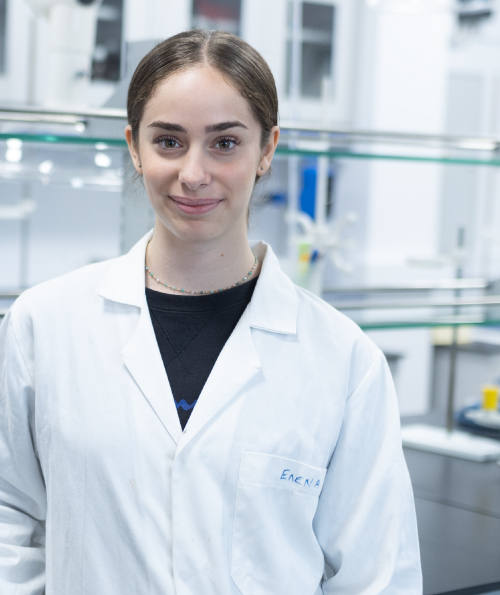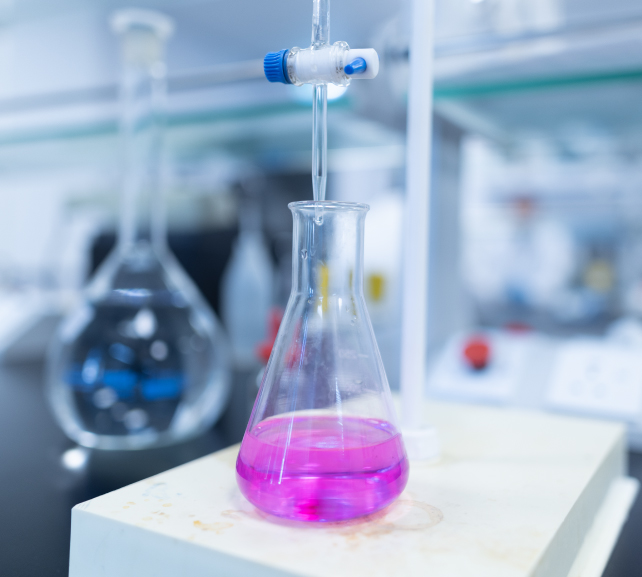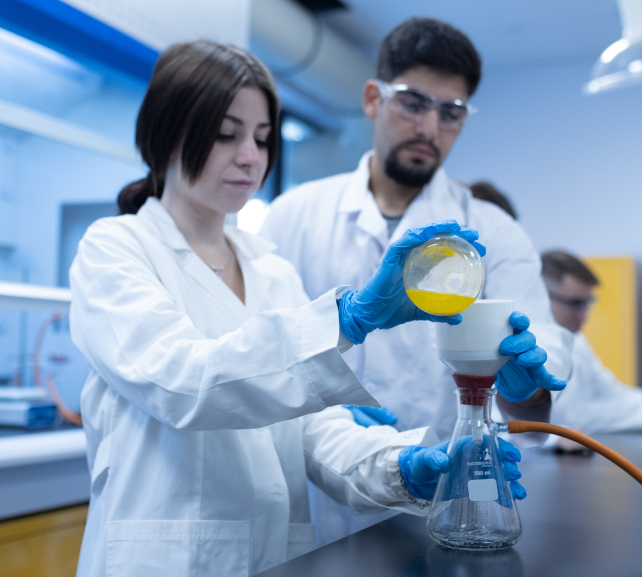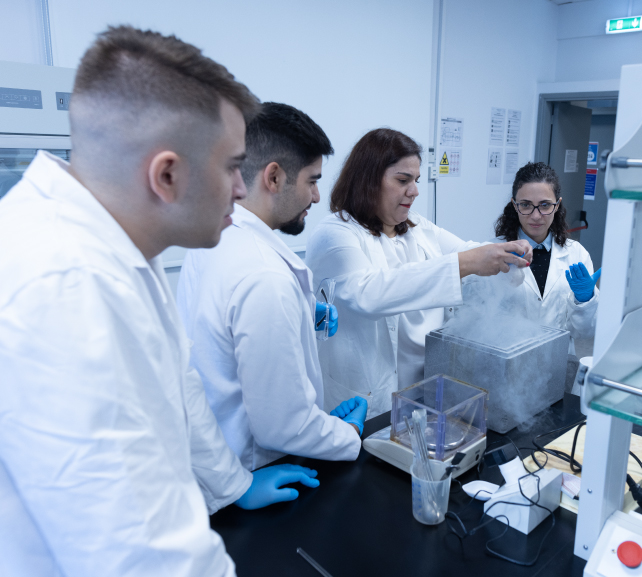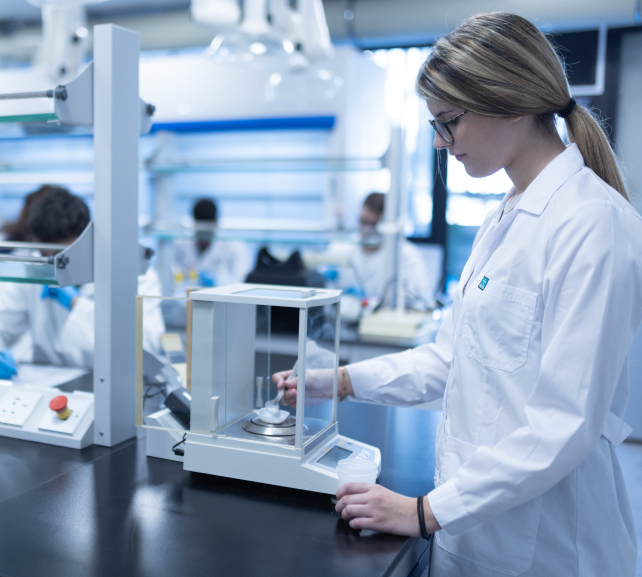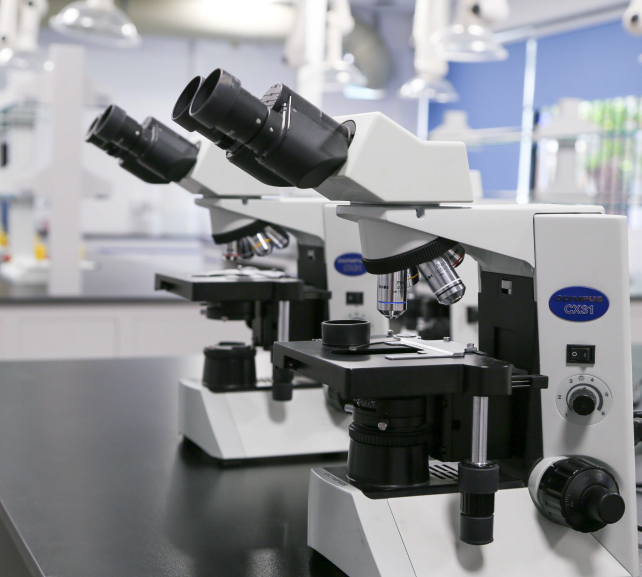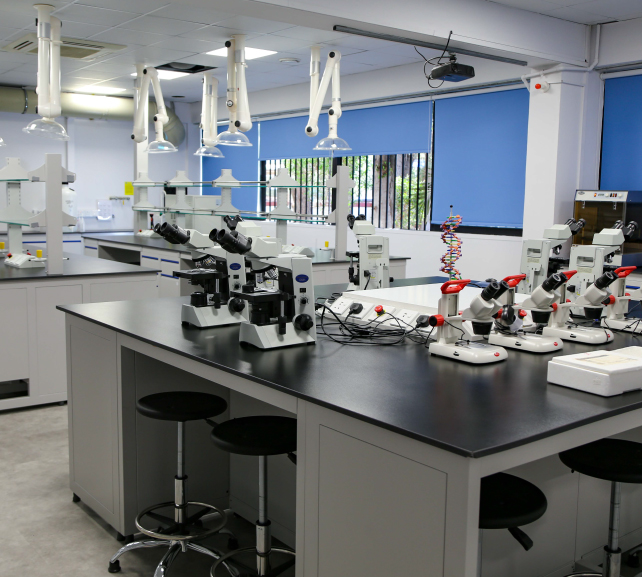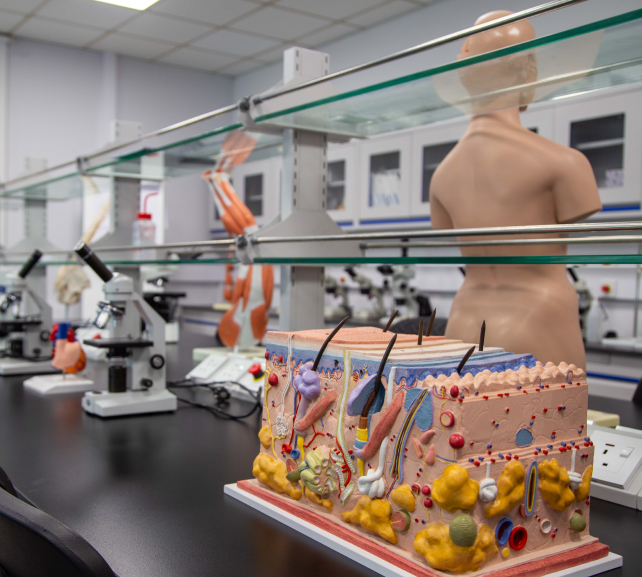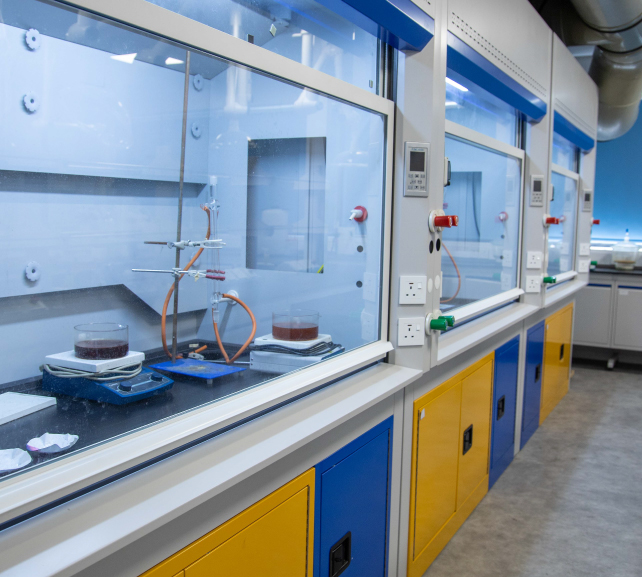PROGRAM DETAILS
Duration5 years (full time)
Fees
€9,450 per year
LanguageGreek
CampusNicosia
The overall aim of the Program is to prepare specialised scientists in the fields of drugs and bioactive compounds for employment in both private and public sectors, including pharmacies, hospitals, clinics, pharmaceutical and cosmetic industries, state drug authorities, and other related departments. The Program provides the academic background necessary to fulfill the obligations of a drug specialist in a highly diversified, developed, and demanding social environment. Additionally, it aims to train pharmacy graduates thoroughly in scientific, clinical, social, and administrative aspects, enabling them to apply updated knowledge and guidelines effectively in patient care.
These objectives are achieved through a combination of basic and specialised courses, preceded by comprehensive preparation. Furthermore, the management, monitoring, and modification processes of the Program, along with the even distribution of the European Credit Transfer System (ECTS), ensure that the content reflects the current demands and evolution of the pharmaceutical sector, maintaining accurate alignment with other European Pharmaceutical Programs.
Program Objectives
- Prepare graduates with the necessary knowledge and skills for employment in both private and public sectors, including pharmacies, pharmaceutical and cosmetic industries, hospitals, and clinics, as qualified professional pharmacists.
- Provide an integrated academic and practical background in pharmacy to enable adaption to rapid scientific and technological advancements.
- Provide a sound theoretical background for further studies and/or research.
- Reinforce understanding of theory through practical training.
- Develop assessment and evaluation skills relevant to drug industry and the market.
- Introduce students to the modern pharmaceutical environment of pharmaceutical businesses, hospitals and governmental services.
- Train students to:
Utilise their knowledge and experience for educational or consultancy purposes.
Possess the core knowledge concerning the principles of pathophysiology of diseases and pharmacotherapy and to be able to collaborate with other health care professionals towards the improvement of health care services, employing evidence-based data for the management of complex cases.
Plan, design and conduct research utilising appropriate methodologies.
Adhere to legal, ethical and professional procedures and laws.
Foster a commitment to lifelong learning for continuous improvement of knowledge and skills.
General Learning Outcomes
Upon completion of the Program, students are expected to be able to:
- Apply critical thinking, decision making, and assessment and problem-solving skills.
- Demonstrate communication and teamwork skills.
- Demonstrate educational and research skills, which are applied to their work.
- Manage human, financial, technological, and physical resources to optimise results.
- Perform self-assessment regarding knowledge and experience and capability of bridging these gaps through lifelong learning.
- Recognise the vocational role of their profession, demonstrating integrity, honesty, knowledge of ethical principles and professional conduct.
- Help diminish discrimination and inequality regarding access to quality health care.
Special Learning Outcomes
The graduates should be able to:
- Develop deep and broad knowledge in pharmaceutical science, with social, behavioural, administrative, and clinical aspects.
- Have good knowledge of pharmacotherapies, drug development and safety in drug use.
- Combine basic scientific knowledge to conclude about drug actions and their administration to the public.
- Evaluate personal, social, economic, and environmental conditions and acquire the language and communication skills required for expert pharmaceutical work.
- Collaborate with in health management and health promotion.
- Collaborate with individuals, families, communities, colleagues and other healthcare professionals to provide quality health care.
- Apply standards, guidelines and legislation, best practice, and established procedures related to the safe and effective use of drugs.
- Research and critically analyse scientific literature related to issues concerning their field of expertise.
- Design preventive and educational practices for disease management and health promotion.
To date, all our graduates are employed (unemployment rate: 0%) in positions relevant to pharmaceutical science, holding positions in hospitals, pharmacies, public services and the pharmaceutical industry in Cyprus and internationally.
Specific Admission Requirements
Candidates can be admitted to the Program only if they satisfy the general admission requirements of the University.
Additional admission requirements for the Program of the Department of Pharmacy are listed below.
Specifically, candidates are expected to hold in the graduation certificate a minimum grade of:
85% in Chemistry and
85% in two of the following subjects: Physics, Biology, and Mathematics.
Candidates not meeting the specific requirements may still be admitted to the Program by completing a free of charge intensive foundation programme offered by the Department, followed by a final assessment.
Recognition of Prior Learning
Candidates can be granted transfer credits according to the general arrangements for recognition of prior learning of the University.
Transfer students, regardless of the number of credits transferred, should complete at least 50% of the ECTS required by the program of study at Frederick University to be eligible for graduation.
Completion Requirements
The examination regulations, assessment methods and grading system for this Program are the same as the relevant general university regulations.
Students must successfully complete 300 ECTS to be eligible for graduation, including theoretical and laboratory courses and practical training.
Module Group
ECTS
The student must successfully complete 218 ECTS, from the following list of modules:
| No. | Code | Name | ECTS | Hours / week |
|---|---|---|---|---|
| 1 | PHA101 | GENERAL AND INORGANIC CHEMISTRY | 6 | 3+3 |
| 2 | PHA102 | GENERAL PHYSICS | 6 | 3+2 |
| 3 | PHA104 | GENERAL BIOLOGY | 6 | 2+2 |
| 4 | PHA105 | INTRODUCTION TO PHARMACEUTICAL SCIENCES | 5 | 3 |
| 5 | PHA103 | MATHEMATICS AND ELEMENTS OF STATISTICS | 6 | 4 |
| 6 | PHA106 | ANALYTICAL CHEMISTRY | 6 | 3+2 |
| 7 | PHA107 | ELEMENTS OF BOTANY | 5 | 2+2 |
| 8 | PHA108 | HUMAN ANATOMY | 6 | 3+1 |
| 9 | PHA201 | PHYSICAL CHEMISTRY | 6 | 4+2 |
| 10 | PHA203 | MICROBIOLOGY | 6 | 2+2 |
| 11 | PHA302 | INORGANIC & BIOINORGANIC PHARMACEUTICAL CHEMISTRY | 6 | 4+2 |
| 12 | PHA205 | HUMAN PHYSIOLOGY AND PATHOPHYSIOLOGY | 6 | 3+1 |
| 13 | PHA211 | ORGANIC CHEMISTRY | 6 | 4+2 |
| 14 | PHA212 | MOLECULAR BIOLOGY AND BIOTECHNOLOGY | 6 | 3+2 |
| 15 | PHA207 | BIOCHEMISTRY I | 6 | 3+2 |
| 16 | PHA208 | PHYSICAL PHARMACY | 6 | 4+2 |
| 17 | PHA305 | HYGIENE AND EMERGENCY THERAPEUTICS | 6 | 2+2 |
| 18 | PHA301 | BIOPHARMACY & PHARMACOKINETICS | 6 | 3+2 |
| 19 | PHA311 | PHARMACOGNOSY I | 6 | 3+2 |
| 20 | PHA303 | PHARMACEUTICAL ANALYSIS I | 6 | 3+2 |
| 21 | PHA304 | BIOCHEMISTRY II | 6 | 2+2 |
| 22 | PHA306 | MOLECULAR PHARMACOLOGY | 6 | 2+2 |
| 23 | PHA307 | PHARMACEUTICAL CHEMISTRY I | 6 | 2+3 |
| 24 | PHA308 | PHARMACEUTICAL TECHNOLOGY I | 6 | 2+2 |
| 25 | PHA309 | PHARMACOLOGY I | 6 | 2+3 |
| 26 | PHA310 | PHARMACEUTICAL IMMUNOLOGY & IMMUNOCHEMISTRY | 6 | 2+2 |
| 27 | PHA312 | PHARMACOGNOSY II | 6 | 3+2 |
| 28 | PHA401 | PHARMACEUTICAL CHEMISTRY II | 6 | 4+2 |
| 29 | PHA402 | PHARMACEUTICAL TECHNOLOGY II | 6 | 3+2 |
| 30 | PHA403 | PHARMACEUTICAL ANALYSIS II AND DRUG CONTROL | 6 | 3+3 |
| 31 | PHA405 | PHARMACOLOGY II | 6 | 3+2 |
| 32 | PHA412 | RESEARCH METHODOLOGY | 6 | 3 |
| 33 | PHA413 | CLINICAL PHARMACY & PHARMACEUTICAL CARE | 6 | 5+1 |
| 34 | PHA408 | TOXICOLOGY | 6 | 3+2 |
| 35 | PHA414 | CHEMISTRY AND TECHNOLOGY OF COSMETICS | 6 | 3+2 |
| 36 | PHA502 | PHARMACEUTICAL LEGISLATION, LAW & ETHICS | 6 | 2 |
| 37 | AENG141 | BASIC ENGLISH FOR PHARMACEUTICAL SCIENCES | 2 | 4 |
| 38 | AENG142 | INTERMEDIATE ENGLISH FOR PHARMACEUTICAL SCIENCES | 2 | 4 |
The student must successfully complete 30 ECTS, from the following list of modules:
| No. | Code | Name | ECTS | Hours / week |
|---|---|---|---|---|
| 1 | PHA508 | POSTGRATUATE THESIS | 30 | 0 |
The student must successfully complete 30 ECTS, from the following list of modules:
| No. | Code | Name | ECTS | Hours / week |
|---|---|---|---|---|
| 1 | PHA509 | PRACTICAL TRAINING (PLACEMENT) | 30 | 0 |
Total
300
Semesters
ECTS
| No. | Code | Name | ECTS |
|---|---|---|---|
| 1 | AENG141 | BASIC ENGLISH FOR PHARMACEUTICAL SCIENCES | 2 |
| 2 | PHA101 | GENERAL AND INORGANIC CHEMISTRY | 6 |
| 3 | PHA102 | GENERAL PHYSICS | 6 |
| 4 | PHA104 | GENERAL BIOLOGY | 6 |
| 5 | PHA105 | INTRODUCTION TO PHARMACEUTICAL SCIENCES | 5 |
| 6 | FREE ELECTIVE | 5 | |
| TOTAL | 30 |
| No. | Code | Name | ECTS |
|---|---|---|---|
| 1 | AENG142 | INTERMEDIATE ENGLISH FOR PHARMACEUTICAL SCIENCES | 2 |
| 2 | PHA103 | MATHEMATICS AND ELEMENTS OF STATISTICS | 6 |
| 3 | PHA106 | ANALYTICAL CHEMISTRY | 6 |
| 4 | PHA107 | ELEMENTS OF BOTANY | 5 |
| 5 | PHA108 | HUMAN ANATOMY | 6 |
| 6 | FREE ELECTIVE | 5 | |
| TOTAL | 30 |
| No. | Code | Name | ECTS |
|---|---|---|---|
| 1 | PHA201 | PHYSICAL CHEMISTRY | 6 |
| 2 | PHA203 | MICROBIOLOGY | 6 |
| 3 | PHA205 | HUMAN PHYSIOLOGY AND PATHOPHYSIOLOGY | 6 |
| 4 | PHA211 | ORGANIC CHEMISTRY | 6 |
| 5 | PHA302 | INORGANIC & BIOINORGANIC PHARMACEUTICAL CHEMISTRY | 6 |
| TOTAL | 30 |
| No. | Code | Name | ECTS |
|---|---|---|---|
| 1 | PHA207 | BIOCHEMISTRY I | 6 |
| 2 | PHA208 | PHYSICAL PHARMACY | 6 |
| 3 | PHA212 | MOLECULAR BIOLOGY AND BIOTECHNOLOGY | 6 |
| 4 | PHA305 | HYGIENE AND EMERGENCY THERAPEUTICS | 6 |
| 5 | PHARMACY ELECTIVE | 6 | |
| TOTAL | 30 |
| No. | Code | Name | ECTS |
|---|---|---|---|
| 1 | PHA301 | BIOPHARMACY & PHARMACOKINETICS | 6 |
| 2 | PHA303 | PHARMACEUTICAL ANALYSIS I | 6 |
| 3 | PHA304 | BIOCHEMISTRY II | 6 |
| 4 | PHA306 | MOLECULAR PHARMACOLOGY | 6 |
| 5 | PHA311 | PHARMACOGNOSY I | 6 |
| TOTAL | 30 |
| No. | Code | Name | ECTS |
|---|---|---|---|
| 1 | PHA307 | PHARMACEUTICAL CHEMISTRY I | 6 |
| 2 | PHA308 | PHARMACEUTICAL TECHNOLOGY I | 6 |
| 3 | PHA309 | PHARMACOLOGY I | 6 |
| 4 | PHA310 | PHARMACEUTICAL IMMUNOLOGY & IMMUNOCHEMISTRY | 6 |
| 5 | PHA312 | PHARMACOGNOSY II | 6 |
| TOTAL | 30 |
| No. | Code | Name | ECTS |
|---|---|---|---|
| 1 | PHA401 | PHARMACEUTICAL CHEMISTRY II | 6 |
| 2 | PHA402 | PHARMACEUTICAL TECHNOLOGY II | 6 |
| 3 | PHA403 | PHARMACEUTICAL ANALYSIS II AND DRUG CONTROL | 6 |
| 4 | PHA405 | PHARMACOLOGY II | 6 |
| 5 | PHA412 | RESEARCH METHODOLOGY | 6 |
| TOTAL | 30 |
| No. | Code | Name | ECTS |
|---|---|---|---|
| 1 | PHA408 | TOXICOLOGY | 6 |
| 2 | PHA413 | CLINICAL PHARMACY & PHARMACEUTICAL CARE | 6 |
| 3 | PHA414 | CHEMISTRY AND TECHNOLOGY OF COSMETICS | 6 |
| 4 | PHA502 | PHARMACEUTICAL LEGISLATION, LAW & ETHICS | 6 |
| 5 | ADVANCED PHARMACY ELECTIVE | 6 | |
| TOTAL | 30 |
| No. | Code | Name | ECTS |
|---|---|---|---|
| 1 | PHA508 | POSTGRATUATE THESIS | 30 |
| TOTAL | 30 |
| No. | Code | Name | ECTS |
|---|---|---|---|
| 1 | PHA509 | PRACTICAL TRAINING (PLACEMENT) | 30 |
| TOTAL | 30 |
The delivery of the program of study is supported by the following members of staff:



